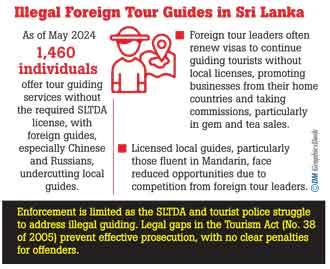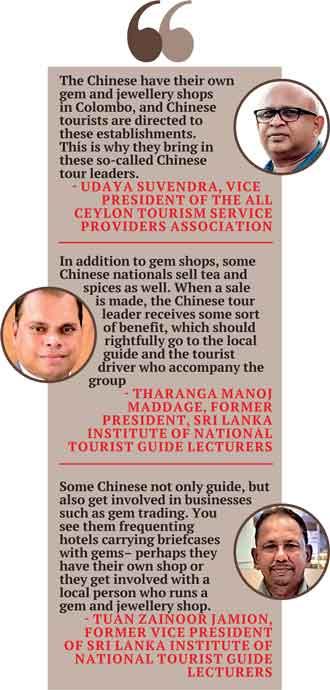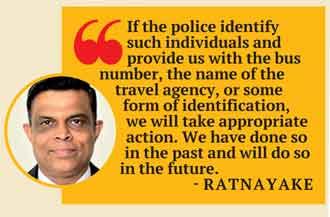Reply To:
Name - Reply Comment

Illegal guiding is a prevalent issue in Sri Lanka, and as of May 2024, there have been approximately 1,460 illegal guides operating in the country
(Photo © civitatis.com)
| One of the major challenges for local guides is the increasing number of foreign guides who attempt to lead tour groups from their home countries |
| This practice is particularly common among Chinese nationals, and occasionally among Russians, according to sources |
| There are also instances where foreign tour leaders continually renew their visas to offer illegal guiding services to tourists |
 Tuk tuk drivers in popular tourist areas to surf boys and city boys step in as unofficial tour guides offering foreigners a taste of authentic Sri Lanka. However, there are also instances where foreign tour leaders continually renew their visas to offer illegal guiding services to tourists arriving from their home countries; eating into the opportunities available for local guides. Can such practices be allowed in a country that heavily relies on its tourism industry?
Tuk tuk drivers in popular tourist areas to surf boys and city boys step in as unofficial tour guides offering foreigners a taste of authentic Sri Lanka. However, there are also instances where foreign tour leaders continually renew their visas to offer illegal guiding services to tourists arriving from their home countries; eating into the opportunities available for local guides. Can such practices be allowed in a country that heavily relies on its tourism industry?
Illegal foreign tour guides
 Illegal guiding is a prevalent issue in Sri Lanka. According to a recent report titled Comprehensive Study of the Sri Lankan Tourist Guides, as of May 2024, there are approximately 1,460 individuals offering tour guiding services without the SLTDA licence. One of the major challenges for local guides is the increasing number of foreign guides who attempt to lead tour groups from their home countries. This practice is particularly common among Chinese nationals, and occasionally among Russians, according to sources.
Illegal guiding is a prevalent issue in Sri Lanka. According to a recent report titled Comprehensive Study of the Sri Lankan Tourist Guides, as of May 2024, there are approximately 1,460 individuals offering tour guiding services without the SLTDA licence. One of the major challenges for local guides is the increasing number of foreign guides who attempt to lead tour groups from their home countries. This practice is particularly common among Chinese nationals, and occasionally among Russians, according to sources.
It has been reported that some foreign tour leaders—guides who arrive with tourist groups—do not return to their home countries once the tour concludes. Instead, they renew their visas monthly and work on organising new groups from their native countries to visit Sri Lanka. They often act as guides for these groups without obtaining the required local guiding licence. In some cases, it is alleged that these tour leaders hire local guides who only speak English to serve as ‘seated guides’ or ‘silent guides’ where they handle minimal guiding and primarily focus on coordination. This has caused frustration among licensed local guides, particularly those fluent in Mandarin. These locals are losing valuable job opportunities.
 It is further alleged that these foreign tour leaders promote Chinese-owned businesses to their tour groups in order to obtain benefits from each sale. “The Chinese have their own gem and jewellery shops in Colombo, and Chinese tourists are directed to these establishments. This is why they bring in these so-called Chinese tour leaders,” claimed Udaya Suvendra, Vice President of the All Ceylon Tourism Service Providers Association.
It is further alleged that these foreign tour leaders promote Chinese-owned businesses to their tour groups in order to obtain benefits from each sale. “The Chinese have their own gem and jewellery shops in Colombo, and Chinese tourists are directed to these establishments. This is why they bring in these so-called Chinese tour leaders,” claimed Udaya Suvendra, Vice President of the All Ceylon Tourism Service Providers Association.
“These Chinese tour leaders are damaging the entire tourism industry,” said Tharanga Manoj Maddage, former President of the Sri Lanka Institute of National Tourist Guide Lecturers. “In addition to gem shops, some Chinese nationals sell tea and spices as well. When a sale is made, the Chinese tour leader receives some sort of benefit, which should rightfully go to the local guide and the tourist driver who accompany the group,” he added.
Maddage further pointed out that there are plenty of qualified Mandarin-speaking tour guides in Sri Lanka, yet they are given fewer opportunities despite the significant number of Chinese tourists visiting the country. “The Chinese tour leaders prefer not to have Mandarin-speaking local guides accompany them, as this would reduce their chances of obtaining some benefit through it,” he explained. “These tour leaders enter on tourist visas and illegally work as guides, violating immigration laws.
“Some Chinese not only guide, but also get involved in businesses such as gem trading. You see them frequenting hotels carrying briefcases with gems– perhaps they have their own shop or they get involved with a local person who runs a gem and jewellery shop. They go to a potential client’s room and other tourists also join them in this room to do business. If they are collaborating with a local gem trader, they are promised benefits, and the local person tags along too,” alleged Tuan Zainoor Jamion, former Vice President of Sri Lanka Institute of National Tourist Guide Lecturers.
Jamion further alleged that some Destination Management Companies (DMCs) have recently implemented a “no shopping” rule during organized tours, meaning there are no scheduled stops at gem or souvenir shops. However, once the tour concludes and tourists return to their hotels in Colombo, the company arranges for a Chinese agent to pick them up and take them to a gem shop, either in Colombo or another location, where they can do their shopping. “This is done without the knowledge of the local tour guide and driver who accompanied the group. The companies do this deliberately to share the benefits among themselves,” Jamion explained. “I’ve heard that this occurs in smaller DMCs, some of which are even licensed. These are unethical practices,” he added.
Meanwhile, Maddage also mentioned that he, along with several other tour guides, had helped apprehend a number of Chinese tour leaders who had entered the country on tourist visas and were engaged in illegal guiding. “I even filed a case in 2023. I raised this issue of illegal guiding with the Sri Lanka Tourism Development Authority (SLTDA) and the Minister. Although they assured me that they would address the problem, no action has been taken. They keep citing a shortage of staff in enforcement units to apprehend these illegal guides,” he explained. “The Tourism Act (No. 38 of 2005) doesn’t empower the tourist police to arrest illegal guides. While it states that such guiding is illegal, it does not specify a penalty or fine,” Maddage added.
Overstaying visas reported from Down South
Russian and Ukrainian tourists overstaying their visas and conducting businesses down south was widely discussed early this year. Not only do they rent out villas and run surf training centres- putting local businesses at risk- but they are also reportedly involved in organising tours.
When there is a request for an individual tour, they reportedly gather other tourists who are interested in the same tour to form a collective tour. In this arrangement, the tourist group travels in one vehicle most often with just one tour guide. “This causes the loss of business for local drivers and area guides. There may be involvement of local partners too – such as a bus owner or a restaurant owner who coordinates the tour while the tourist (who has overstayed their visa or keeps renewing it) sells it among his/her group. It’s mostly the Russians or Ukrainians that are involved in such acts down south, which undermines tourism and fosters a culture of cheap tourism,” claimed Suvendra.
Local tourist scammers
According to Maddage, many issues that tourists encounter in Sri Lanka would likely not occur if they were accompanied by licensed tour guides, as all relevant information about the guides is maintained by the SLTDA. He emphasised the responsibility of the SLTDA as the regulatory body to ensure that illegal guiding is entirely eradicated.
Meanwhile, Suvendra observed that numerous local scammers lurk around popular hotels, waiting for opportunities to deceive unsuspecting tourists. According to him, these scammers keep their eyes out for new tourists arriving at each hotel. Then, they approach the tourist on the street and say, ‘You came today right? I work in the same hotel,’ and introduce themselves as the chef, engineer or hotel doctor. “Usually, they can tell whether a tourist is new to the country if they aren’t sunburnt. To convince the tourists, they dress smart, so that their identities are not given away. They then talk about random things with the tourist and attempt to build trust. Thereafter, the scammer would announce some festival in a particular area and invite the foreigner to join him. He then stops what seems to be a random tuk on the road and takes the tourist to show something and eventually stops at a gemstone shop or shop selling other souvenirs. If the foreigner buys from this shop, the scammer receives a percentage and the foreigner is not scammed any further. However, if the tourist is not interested in making a purchase, he is demanded to settle a high taxi fare. These scammers also present themselves as guides, but they do nothing but touting and scamming,” noted Suvendra. He added that the tourist police are well-aware of these incidents, but are usually unable to control it.
Better regulation of illegal guides required
“We have repeatedly urged the SLTDA to put an end to illegal guiding, as they are the regulatory body responsible for enforcing these regulations. The government issues licences for tour guiding for a reason; when individuals enter the profession without obtaining a licence, they damage our reputation and create numerous problems. This is why I filed a case against the SLTDA in the Supreme Court,” Maddage stated.
“They don’t consider the harm they inflict on the industry. Some of these travel agents are not even registered with the SLTDA. Previous governments have done nothing to address the issues of illegal guides and foreign guides operating without authorization. I have submitted proposals to the new government and they are expected to tackle this issue after the general election,” Maddage added.
He noted that some tour agents find it more profitable to employ illegal guides because they demand lower salaries and often stay outside the hotels where tourists are accommodated. According to Jamion, there is an agreement between the SLTDA and tourist guide lecturers stating that tour agencies must provide accommodation in the same hotel as their guests.
Jamion further emphasised that the Tourism Act does not impose any penalties for illegal guiding, which means that the tourist police can only issue warnings to offenders. “This approach is ineffective in curbing illegal guiding. We want this to stop. The SLTDA is aware of the situation; they should take action,” he charged.
‘Collective effort needed to combat illegal guiding’
 “A tour leader accompanying a tour group is the person who takes the responsibility of that group, but they cannot guide at all,” emphasised Upali Ratnayake, Deputy Director General of SLTDA, when Daily Mirror reached out to understand the SLTDA’s stance on illegal guiding – particularly in the case of foreign tour guides. “If the police identify such individuals and provide us with the bus number, the name of the travel agency, or some form of identification, we will take appropriate action. We have done so in the past and will do so in the future. While the power to deport lies with immigration officers, we can address issues related to the travel agencies licensed with us,” said Ratnayake.
“A tour leader accompanying a tour group is the person who takes the responsibility of that group, but they cannot guide at all,” emphasised Upali Ratnayake, Deputy Director General of SLTDA, when Daily Mirror reached out to understand the SLTDA’s stance on illegal guiding – particularly in the case of foreign tour guides. “If the police identify such individuals and provide us with the bus number, the name of the travel agency, or some form of identification, we will take appropriate action. We have done so in the past and will do so in the future. While the power to deport lies with immigration officers, we can address issues related to the travel agencies licensed with us,” said Ratnayake.
Speaking further, he noted that when complaints about illegal foreign guiding are reported to them, their initial course of action is to advise the travel agency that brought the tour group against such practices. If the agency continues to disregard these warnings, the SLTDA will suspend its licence for a specified period.
When queried about the prevalence of illegal local guides, Ratnayake acknowledged that the enforcement responsibility lies with the tourist police and the SLTDA. He noted that the SLTDA has informed the Director of the tourist police in writing to verify whether individuals accompanying tour groups for guiding purposes hold a valid licence. “If the individual (who is guiding) doesn’t have a valid licence, we have asked the tourist police to warn them and to get their personal information such as contact numbers and names. We then disseminate this information to the training organisation asking them to include them in the next training. Because we don’t want to be only policing but also assisting,” he said.
He further explained that there are no spot fines for illegal guiding, noting that those accused of the offence must be brought before the court. “We need to prove that they have been guiding tourists illegally, and the fine for this is approximately Rs.250000,” he said. However, he pointed out that the challenge with prosecuting these cases is that tourists often do not come forward to provide evidence. Many are already out of the country during the hearings, while others prefer not to jeopardise their holidays or may form friendships with the tour guides, leading them to hesitate in offering testimony. “Therefore, the best approach is to continue conducting checks at the entrances of tourist sites,” he concluded.
Ratnayake added that while some small-scale travel agencies employ individuals who have some knowledge to guide tour groups, there are instances where tourists directly contact locals, like beach boys, and arrive in the country through them, thereby the beach boys act as informal guides for them.
He noted that there is a possibility that the number of graduates that are put out through the Sri Lanka Institute of Tourism & Hotel Management (SLITHM) may not be sufficient to meet the demand for tour guides. “Therefore they (SLITHM) will have to look at recruiting more people because we provide licences for those who are trained at that education institute.”
He underscored that combating this issue was a collective effort.
Ratnayake also added that an app was being launched to allow tourists to choose a licensed guide conveniently. This app, which will be launched soon, will allow tourists to rate their guides as well.
Tour guide licencing
Those who do not possess the appropriate licences but engage in guiding are considered “illegal guides.”